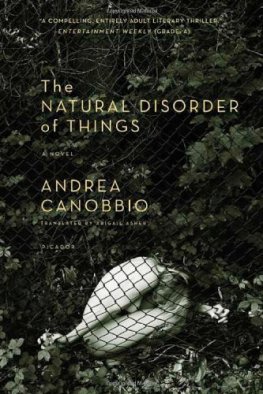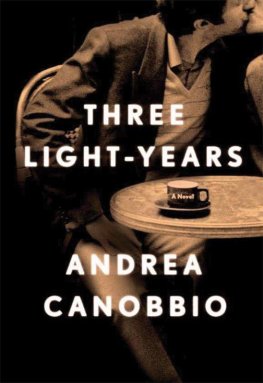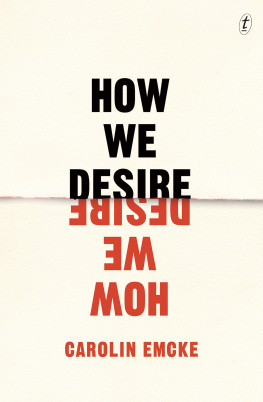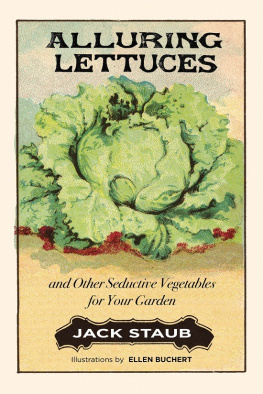Andrea Canobbio
The Natural Disorder of Things
THE FIRST TIME IT WAS HER VOICE, THAT FAULTY AND UNSTEADY RHYTHM IT hypnotized me. If it hadnt been for that voice I wouldnt have paid her any attention. She used the formulaic phrases that clients always do: she had heard a lot about me, shed seen and visited this and that, she was interested, even enthusiastic. Theyre always enthusiastic on the phone. Then I see that theyre taken aback when they actually meet me. I guess theyre thinking they have wasted their breath; maybe they ask themselves why I look nothing like my gardens, where I hide all that intelligence and elegance.
I had promised to call her back, to set a date to inspect the site, but I kept putting it off. A week later it was she who called me again, at the same time, apologizing for calling so late; it was as if the ghost of her garden, the naked and abandoned garden, appeared to her in a dream, at the same time of night each week, demanding retribution, and her sense of shame and guilt drove her to seek some remedy.
Again I didnt have the strength to say no to her; I didnt want to take on a new assignment, but I couldnt do without one, and I would have ended up refusing two or three offers at random before being compelled to accept perhaps the least interesting of the lot. I promised her wed meet that Friday; she shouldnt worry, I wouldnt forget her. But in fact thats just what I intended to do: I was slumped on the sofa in the center of the kitchen, with no energy to clear the table, staring into space, and I lied to her so easily because Id also finished eating the food on the plate for the guest. Usually Im lucid as long as Im at my own place at the table, sitting on the chair: thats why the guests spot is on the sofa, so he can sink into it.
Elisabetta Renal apologized, complaining that she could never reach me when she called my house and didnt have my cell-phone number I hadnt given it to her the first time; I pretended not to notice and didnt give it to her on the second call either. I stared at a pile of bread crumbs half hidden by the broom that had been propped against the wall several days earlier, and the line of busy ants at work, like a writers ellipses heightening the suspense in a sentence but the coup de thtre never came. I wouldnt remember this call the next day, even though it was the second in a week; I wouldnt remember her and her childlike voice, her apologies for ringing so late, the clichs and commonplaces; I wouldnt remember how much I liked the way she uttered these social banalities, with a childs pauses and hesitations and sudden bursts of speed.
Her voice was so beautiful and promising: there was no way that voice could lie. There was no need for it to be rhythmic and regular; no need for it to be balanced; it seemed not to know that it could ever go off balance, that people might ever beg or attack. And for just an instant after hanging up, when I went back to staring into space, staring at the crumbs and at the ants, I imagined listening to her voice in the dark and falling asleep inside it; I imagined her leaning over my ear and pouring words her stories into my head.
Five days went by, and I was in the car with Witold; wed had an argument and maybe Id offended him, and then something distracted me like a wave of melancholy; I almost rear-ended a truck carrying yogurt, and I stopped and got out to take a closer look at an old abandoned factory. Was it abandoned? I dont know. The sun was shining in a cloudless blue sky, it wasnt yet very hot, and the block of reinforced concrete gave off an air of cheerful ruination; there was a touching detail in the courtyard of the watchmans house: a laundry line strung with faded little pajamas and shorts and T-shirts. My mood had changed now, and I turned back to the car (Witold was bolted into his seat, staring straight ahead) and saw the yellow arrow, camouflaged by an explosion of forsythia, with Villa Renal written on it, and then I remembered Elisabetta Renals voice and decided I wanted to hear it again.
I shift the car into gear, back up, turn into the road that runs alongside the possibly abandoned factory, and drive in silence for three minutes and thirty seconds, up and down the sulky hills, before Witold, without looking at me, asks where were going. I tell him about the two phone calls, and I lie and say that Id asked around and the client seemed promising: maybe it will turn into a job for the springtime and part of the summer. Witold, with his impoverished-noble profile, his eyes locked on a pair of pollarded willows facing each other across a twenty-yard gap, each one as sad as an only child. After a bit he remarks that one doesnt go to meet a new client wearing dirty work clothes. I feel that Ive made an effort to make peace with him; its fine with me if he wants to be in a huff, so I say that his innate elegance will save face for both of us. He goes gray and smoky like an illegal building being demolished, dynamited and imploding.
I turn left and pass under a brick archway without any gate or caretaker; were on the property, but the house isnt visible, and we run along beneath the elms, lindens, and horse chestnut trees flanking the dirt road that sinks into a shady little valley. I shout above the crackle and crunch of the tires to say that the fat cows who own this place will produce enough milk to get us through the whole winter, and guffaw because Witold doesnt like cynicism (not even false cynicism) hes a guy with no sense of humor, he doesnt like a pat on the shoulder, an ambiguous wink, an insinuation (he doesnt understand insinuations), or vulgarity, whether explicit or implicit. Hes really quite a heavy character. And Im about to push on and provoke him further when a powerful blow strikes my side window; my Renault R4 wobbles from the impact, but I keep it on the road and try to understand whats happening.
It took me ten or twenty seconds to see it, maybe because of the dust we kicked up, maybe because it was running alongside the car. It was a dog jumping and butting its head against the car, trying to sink its teeth into the side mirror, where it saw flashes of an enemy dogs ferocious face. It wasnt barking, just baring its teeth and throwing itself against the door and the side window, certain it would manage to break through. Witold yelled at me to stop, stop, I might run it over, and I obeyed, sort of: I slowed down sharply, and the dog found himself running ahead, followed by the slow-moving car, surprised and excited as if hed proved he could defeat us, as if hed already won.
Then he turned his head, leaping from side to side in a dance of death, challenging me to speed up again, to run him over. I dont know what came over me, because I wasnt upset or afraid I was scared, but not scared of the dog (I felt quite calm and lucid about the dog); what I was actually scared about was the garden of perfectly tended hedges and flower beds that stands in the center of my reasoning mind, a garden that allows for nothing anomalous, asymmetrical, excessive, or banal; from the center of that garden came the impulse to push down on the accelerator, and my right foot acted on the impulse: the R4 speeded up suddenly, and the dog didnt expect it, he dodged out of the way too late.
Id never felt what its like to run over a dog; Id hit a rabbit and two cats, but you hardly notice such small animals. A dog makes you feel his death beneath the chassis, and especially with an R4, which is built from the same tin they use for canned tuna, you feel the bones breaking and the fur tearing and the innards bursting, or anyway youre supplied with a full range of sounds from which you can choose the sounds of a dog breaking apart. When we got out, though, he was in one piece, dead but not bleeding: dust and crushed stone had already smothered the wounds. It was a German shepherd, coated with dirt, eyes wide open.









